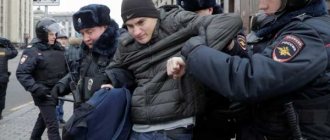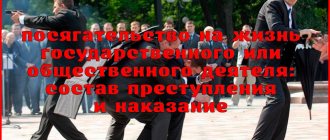Each person, existing in a social society, is obliged in his behavior to take into account the interests of the people around him.
Society has established rules of behavior, mutual respect and responsibility for breaking order.
Someone wants to sleep after a hard day at home, someone wants to get home by bus in complete peace and quiet. He has the right to this, and his right is guaranteed by regulations.
Violating public order in the country is not only an administrative offense, but also a criminal offense.
The material in this article will tell you what awaits troublemakers and hooligans, and what rules apply in a safe society.
Disturbing public order in public places
The content of the article
Public places, in addition to places of significant concentration of citizens ( streets, public transport, airports, train stations, parks ) include any places that are free for access by an indefinite circle of people in which there are or may appear people (entrances, underground passages, landings, territories gardening partnerships, etc.). The subjects of the offense are sane citizens over 16 years of age. Taking into account the fact that the sanctions of the article provide for an alternative punishment in the form of administrative arrest, holding certain categories of violators accountable is carried out taking into account the provisions of Part 1 of Art. 2.5, part 2 art. 3.9 Code of Administrative Offenses of the Russian Federation. The subjective side of the offense is guilt in the form of direct intent.
Article 20.1. petty hooliganism
- Swimming in lakes, reservoirs and rivers in places where this is strictly prohibited
- Damage to flower beds or lawns by picking flowers and other seedlings
- Intentional damage to signaling or communication equipment, automobile, port, railway and other equipment, throwing stones at moving trains
- Intentional damage to payphones or their booths
- Parking a vehicle in an undesignated place
- Storing waste in places where it is not intended
- Violation of generally established rules for walking animals or keeping them at home
- Clogging of stadium stands and their grounds when watching sporting or entertainment events
This is an incomplete list of violations of public order, which, unfortunately, are most often committed by our compatriots.
Hooliganism concept
When it comes to disturbing public order, the first thing that comes to mind is hooliganism. Indeed, the legislator classified petty hooliganism as offenses that violate public order.
But different actions are called hooliganism, and a lot depends on their interpretation. After all, it is necessary to distinguish whether they relate to petty hooliganism or are still considered a crime. There are no clear boundaries here, although there are some qualifying features.
Petty hooliganism is considered a violation of public order, and hooliganism as a crime is defined as a gross violation of order. Now, if the actions were accompanied by the use of weapons or explosives, then this is definitely a crime. In a situation where a representative of the authorities wanted to stop such actions, everything became a little more complicated. Disobedience to him classifies actions as administrative offenses, and resistance is already a crime. This will largely depend on the words of the government representative himself. Of course, you can find witnesses, but if there were none, can only the victims tell about the events?
The question of qualification of the act is very important; not only the type of punishment depends on it, but whether the accused will be recognized as a criminal or a delinquent. And the consequences of violating public order then vary greatly.
Article 20.1 of the Code of Administrative Offenses of the Russian Federation. petty hooliganism
In fact, hooliganism is a separate article in the list of offenses and one of the types of crimes, the basis of which is offenses of various kinds. But in reality, it is precisely incrementation: hooliganism and grounds for liability according to the relevant article, which is present in both the Criminal Code (criminal code) and the AK (administrative code). It is considered one of the most common categories in modern law enforcement practice.
Criminal or administrative liability
Both in the Criminal Code of the Russian Federation and in the Criminal Code, entire sections are allocated to the composition of atrocities that encroach on violations of various kinds in a public place. Which include a whole range of rules, consisting of many elements and penalties (sanctions). If the Criminal Code is exclusively under the jurisdiction of the state and includes a single list of crimes.
Petty hooliganism: what punishment awaits the offender?
On behalf of the internal affairs bodies (police), cases of administrative offenses provided for in this article may be considered by the heads of territorial internal affairs bodies, their deputies, heads of territorial departments (branches, points) of the police and their deputies; heads of line departments (directorates) of the transport police, their deputies; heads of duty shifts of duty units of linear transport police departments (directorates), heads of linear police departments (points); senior district and local police commissioners (clauses 1 - 3, 9, part 2, article 23.3 of the Code of Administrative Offenses of the Russian Federation).
What measures are provided for violating public order?
Responsibility for these offenses
Public order is a huge institution in terms of composition, structure of legal relations, and norms of behavior. If we consider exclusively the issue of punishment for such acts, then the type of punishment can be distinguished as follows:
- Criminal procedure
- Administrative responsibility
- Disciplinary responsibility
- Civil law
It is incorrect to consider any of the presented violations as an act of hooliganism, despite the fact that in everyday life, the lion's share of all offenses is actually interpreted as such. But we emphasize once again that this approach is very erroneous only in the way of life, in legal proceedings.
Can a consumer really protect his rights in the Russian Federation?
Not really
General provisions
Definition 1
Social order is a system of certain relations that have developed between members of society and include rules of communication, behavior, living, established by legal norms and based on moral standards.
Social order is based on relationships that contain historically established, traditional, religious and sacred moral norms and the foundations of society. Compliance with all moral norms and ethical rules is an indicator of the education of the individual and citizen.
Man and society are objects of security. Society is a rather complex organism, which is a collection (community) of people living in a certain territory and characterized by the integrity of the organization of life, spiritual and economic unity. Public security represents security, personal integrity, public peace, integrity of property with the normal and adequate functioning of all public institutions.
Are you an expert in this subject area? We invite you to become the author of the Directory Working Conditions
course work on this topic
Proceedings in cases of administrative offenses: principles, stages. see more in Chapter 20) administrative liability is provided for attacks on public safety and public order. The object of these attacks are the relationships that develop for the normal functioning of the entire system of established social relations, based on the principles of personal integrity, moral standards and the preservation of public peace.
Public order is affected by administrative violations, which include:
- offenses of public order in the form of unauthorized processions, meetings, pickets, demonstrations and rallies;
- petty hooliganism;
- demonstrations of symbols and paraphernalia of fascism;
- violations in the field of military records;
- violations in weapons registration;
- fire safety violations;
- violations of civil defense rules and much more.
Finished works on a similar topic
Course work Offenses of public order 440 ₽ Essay Offenses of public order 230 ₽ Test work Offenses of public order 230 ₽
Receive completed work or specialist advice on your educational project Find out the cost
Public order
A representative of the government should be understood as a person vested in the manner prescribed by law with administrative powers in relation to persons who are not officially dependent on him (Article 2.4 of the Code of Administrative Offenses of the Russian Federation, paragraph 3 of the Resolution of the Plenum of the Supreme Court of the Russian Federation of October 16, 2009 N 19 “On Judicial Practice in cases of abuse of power and abuse of power").
In relation to this norm, other persons include persons who, by law or other regulatory legal acts, are vested with powers, including temporary ones, to perform duties to protect public order. It should be taken into account that the fact that these persons have the powers to protect public order and suppress offenses does not imply that they have jurisdictional powers to draw up protocols and consider cases of administrative offenses of this category.
What actions characterize a violation of the law
These include:
- actions that are detrimental to dignity and personality;
- showing disrespect towards certain persons;
- changing the location of things with the intent to cause harm or other damage;
- obsessive harassment;
- offensive sentences;
- causing damage to property and other valuables.
During the preparation of protocol documents by law enforcement officers, the time and location of the commission of the unlawful act are recorded.
Article 20.1 of the Code of Administrative Offenses of the Russian Federation. petty hooliganism (current edition)
Part 2 of the commented article provides for liability for committing qualified petty hooliganism associated with disobedience to the legal demand of a government official or other person performing duties to protect public order or suppressing a violation of public order. In this case, disobedience must be in a direct causal connection with an attempt by government officials or other persons to stop hooliganism.
For example, the actions of a person brought to the duty station of the internal affairs bodies for committing petty hooliganism, associated with refusal to comply with the lawful request of police officers for a personal search, cannot be qualified under Part 2. Such actions constitute a combination of offenses provided for in Part 1 of this article and Part 1 of Art. 19.3 Code of Administrative Offenses of the Russian Federation.
An example of an unlawful act qualified as petty hooliganism is a person performing his natural necessities in public places not designated for this purpose, accompanied by obscene language towards citizens who make comments to a violator of public order.
It should be especially noted that the presence in action of only the main sign of the objective side or one of the optional ones (a fight in a public place, as well as obscene language in a public place) does not constitute petty hooliganism. Also, actions (quarrels, fights, accompanied by obscene language and damage to property) committed out of personal hostility in an apartment, other residential premises, against relatives or acquaintances, do not constitute petty hooliganism, if is no intention of the person to disrupt public order and express clear disrespect to society .
In the Criminal Code, for a detainee who is accused under the article of hooliganism, the range of punishments looks slightly different: starting from the same fine and forced labor to imprisonment for a term of from five (in case of incrimination in Part 1) to 7 years (if he is tried according to part 2). This section presents all administrative violations, their interpretation, measures and terms of punishment, as well as advice on how to behave if you find yourself in such a situation. In the modern world, all people are constrained and limited in some way.
Criminal Code
When hooligan acts are committed with the use of weapons, the fine can be up to 500 thousand rubles, or the offender can be imprisoned for up to 5 years. Crimes characterized as vandalism are punishable by a fine of up to 40 thousand rubles. Arrest for up to 90 days is also possible, or the violator can be imprisoned for up to three years. Severe punishments are applied to people who organize mass disorder. For such an act you can be imprisoned for up to 15 years.
The organizer of a violation of the order, during which property was damaged, may be sentenced to prison for up to 8 years.
Violation of public order in public places article
Taking into account the fact that the sanctions of the commented article provide for alternative types of punishment - a fine or administrative arrest, and the appointment of administrative arrest falls within the exclusive competence of judges (Part 1 of Article 3.9 of the Code of Administrative Offenses of the Russian Federation), the legislator has also established alternative jurisdiction for the consideration of cases of administrative offenses of this category - judges (Article 23.1 of the Code of Administrative Offenses of the Russian Federation) and internal affairs bodies (Part 1 of Article 23.3 of the Code of Administrative Offenses of the Russian Federation). Judges consider cases of administrative offenses provided for in the commented article in cases where the body or official to whom the case was received transfers it to a judge for consideration (Part 2 of Article 23.1 of the Code of Administrative Offenses of the Russian Federation). At the same time, in accordance with Part 3 of Art. 23.1 of the Code of Administrative Offenses of the Russian Federation, cases under this article are considered only by judges of district courts.
Legislative regulation
There is no separate article for violating public order. Since a whole complex of various actions can violate this order, several articles of the Criminal Code and the Code of Administrative Offenses of the Russian Federation are used to determine responsibility for these actions:
- Article 20.1 of the Code of Administrative Offenses of the Russian Federation for petty hooliganism.
- Article 20.10 of the Code of Administrative Offenses of the Russian Federation for the illegal production and trade of pneumatic weapons.
- Article 212 of the Criminal Code of the Russian Federation for organizing mass riots.
- Article 213 of the Criminal Code of the Russian Federation for hooliganism.
- Article 214 of the Criminal Code of the Russian Federation for vandalism.
Vandals often act because of some political views. For example, they destroy the graves of representatives of a certain nationality or draw swastikas on them.
Responsibility for violating public order
Administrative responsibility
Petty hooliganism, that is, a violation of public order, expressing clear disrespect for society, accompanied by obscene language in public places, offensive harassment of citizens, as well as destruction or damage to other people's property, entails the imposition of an administrative fine in the amount of five to ten times the minimum wage or an administrative fine arrest for up to fifteen days. The same actions involving disobedience to the lawful demand of a government official or other person performing duties to protect public order or suppress a violation of public order shall entail the imposition of an administrative fine in the amount of ten to twenty-five times the minimum wage or administrative arrest for a term of up to fifteen days. (Article 20.1 of the Code of Administrative Offenses of the Russian Federation[16]).
Resistance shown to a person suppressing hooliganism is not covered by hooliganism only in cases where, as a result of the violence used, the perpetrator commits another, more serious crime.
Resistance provided after the cessation of hooliganism, in particular in connection with the subsequent detention of the perpetrator, should not be considered as a qualifying circumstance of hooliganism and must be qualified in conjunction with the latter.
Hooliganism should be distinguished from other crimes depending on the content and direction of the perpetrator’s intent, motives, goals and circumstances of the actions committed by him. Insults, beatings, infliction of minor or less serious bodily harm and other similar actions committed in a family, apartment, against relatives, acquaintances, caused by personal hostile relationships, incorrect actions of the victims, etc., must be qualified under the articles of the Criminal Code of the Russian Federation, providing for liability for crimes against the person. However, in cases where such actions were associated with a gross violation of public order that was obvious to the perpetrator and expressed clear disrespect for society, they should be qualified as hooliganism.
In accordance with the Resolution of the Plenum of the Supreme Court of the Russian Federation of December 24, 1991 No. 5[17], hooligan acts in most cases are committed due to drunkenness . When assigning punishment to persons who committed hooliganism while intoxicated, courts should discuss the issue of recognizing this fact as an aggravating circumstance.
According to this Resolution, in their practice , courts should not allow a broad interpretation of the concept of “criminal hooliganism” so as to exclude cases of bringing to criminal liability persons guilty of petty hooliganism or minor offenses entailing administrative liability or the use of public sanctions. Judges should not allow cases of bringing to administrative responsibility for petty hooliganism persons whose actions contain signs of crimes (arbitrariness, insult, battery, minor bodily injury, etc.) or misdemeanors that are not petty hooliganism, but entail administrative liability by law (appearing drunk in public places, violating traffic rules on streets and roads, etc.).
According to the Determination of the Constitutional Court of the Russian Federation of April 19, 2001 No. 70-O “On the refusal to accept for consideration the complaint of citizen Irina Georgievna Grebneva about the violation of her constitutional rights by Article 158 of the RSFSR Code “On Administrative Offences” [18] Art. 158 of the RSFSR Code of Administrative Offenses recognizes petty hooliganism
- obscene language in public places,
- offensive harassment of citizens and other similar actions that violate public order and peace of citizens;
The content of this norm indicates that it is aimed at protecting the dignity of the individual and personal integrity (Part 1 of Article 21, Part 1 of Article 22 of the Constitution of the Russian Federation[19]), to maintain a social order in which human rights and freedoms and citizens are guaranteed against violations as a result of the unlawful behavior of others.
The use of administrative arrest for these offenses (in addition to other measures of influence) is allowed only by court decision, which is consistent with Art. 22 (part 2) of the Constitution of the Russian Federation.
Carrying out hooligan actions motivated by ideological, political, racial, national or religious hatred or enmity , as well as motivated by hatred or enmity towards any social group is considered as a type of extremist activity (extremism) (see paragraph 1 of article 1 of the Federal Law of July 25, 2002 No. 114-FZ “On Combating Extremist Activities” [20]).
According to Part 1 of Art. 116 of the Penal Code of the Russian Federation[21] , petty hooliganism committed by a person sentenced to imprisonment is qualified as a malicious violation by the specified person of the established procedure for serving the sentence. In accordance with Art. 40 of the Federal Law of July 15, 1995 No. 103-FZ “On the detention of suspects and accused of committing crimes” [22] and clause 4.1 of the Internal Regulations of temporary detention centers for suspects and accused of internal affairs bodies, approved by the Order of the Ministry of Internal Affairs of Russia dated January 26, 1996 No. 41, [23] the commission of petty hooliganism by the suspect or accused is grounds for his placement in solitary confinement or a punishment cell.
The subject of this offense is a sane person who has reached the age of sixteen at the time of the commission of the offense. In this case, it is necessary to take into account the peculiarities of the administrative responsibility of minors.
The subjective side of the administrative offense in question is characterized by the presence of guilt in the form of direct intent: the offender consciously seeks to violate public order, anticipating the harmful consequences of his act.
The object of this offense is public order - the rules of conduct of citizens regulated by law in their communication with other individuals. Violation of the established procedure for organizing a meeting, meeting, demonstration, procession or picketing shall entail the imposition of an administrative fine on the organizers in the amount of ten to twenty times the minimum wage.
Violation of the established procedure for holding a meeting, meeting, demonstration, procession or picketing entails the imposition of an administrative fine on the organizers in the amount of ten to twenty times the minimum wage; for participants - from five to ten times the minimum wage.
Organizing or holding an unauthorized meeting, rally, demonstration, procession or picketing in the immediate vicinity of the territory of a nuclear installation, radiation source or storage facility for nuclear materials or radioactive substances, as well as active participation in such actions, if this made it difficult for the personnel of these facilities to perform their official duties or created a threat to the safety of the population and the environment, entails the imposition of an administrative fine in the amount of ten to twenty times the minimum wage or administrative arrest for up to fifteen days (Article 20.2 of the Code of Administrative Offenses of the Russian Federation).
In accordance with Art. 16 of the Federal Law of July 25, 2002 No. 114-FZ “On Combating Extremist Activities”, extremist activities are not allowed . Organizers of mass actions are responsible for compliance with the requirements established by the legislation of the Russian Federation regarding the procedure for conducting mass actions, preventing the implementation of extremist activities, as well as its timely suppression. The organizers of a mass action are warned in writing about this responsibility by the internal affairs bodies of the Russian Federation before it takes place. Participants in mass actions are prohibited from carrying weapons (except in those areas where carrying bladed weapons is part of the national costume), as well as items specially manufactured or adapted to cause harm to the health of citizens or material damage to individuals and legal entities.
When carrying out mass actions, it is not allowed to attract extremist organizations to participate in them, use their symbols or paraphernalia, as well as distribute extremist materials. If these circumstances are discovered, the organizers of the mass action or other persons responsible for its conduct are obliged to immediately take measures to eliminate these violations. Failure to comply with this obligation entails the termination of the mass action at the request of representatives of the internal affairs bodies of the Russian Federation and the responsibility of its organizers on the grounds and in the manner provided for by the legislation of the Russian Federation. Firing a weapon in populated areas and in other places not designated for this purpose, as well as in places designated for this purpose in violation of established rules, shall entail the imposition of an administrative fine in the amount of up to ten times the minimum wage with or without confiscation of the weapon and ammunition for it (Art. 20.13 Code of Administrative Offenses of the Russian Federation). A weapon is fired when it is applied or used.
The characteristics of a firearm that distinguish it from pneumatic, gas and other types of weapons are defined by the Federal Law “On Weapons”.[24] For the purposes of Article 20.13 of the Code of Administrative Offenses of the Russian Federation, populated areas are understood to be urban and rural settlements. Settlements in the Russian Federation are divided into urban (cities, towns) and rural (villages, villages, hamlets, hamlets, kishlaks, auls, camps, villages and others).
In Article 20.13 of the Code of Administrative Offenses of the Russian Federation, an offense means shooting by an offender that is not motivated by external illegal actions: for example, the use of firearms due to the need for self-defense, as well as the suppression of an offense, is not an administrative offense.
The administrative offense in question does not include the use of firearms in cases specifically provided for by law. According to paragraph 65 of the Rules for the circulation of civilian and service weapons and ammunition on the territory of the Russian Federation, approved by Decree of the Government of the Russian Federation of July 21, 1998 No. 814,[25] organizations, regardless of the form of ownership, engaged in reindeer husbandry in the regions of the Far North and equivalent to localities, as well as specialized enterprises engaged in hunting or marine hunting, have the right to use hunting firearms, including those with a rifled barrel. Organizations involved in reindeer husbandry have the right to constantly use such weapons to protect the reindeer population from large predators.
The offense in question is qualified at the time of the unlawful use of firearms.








